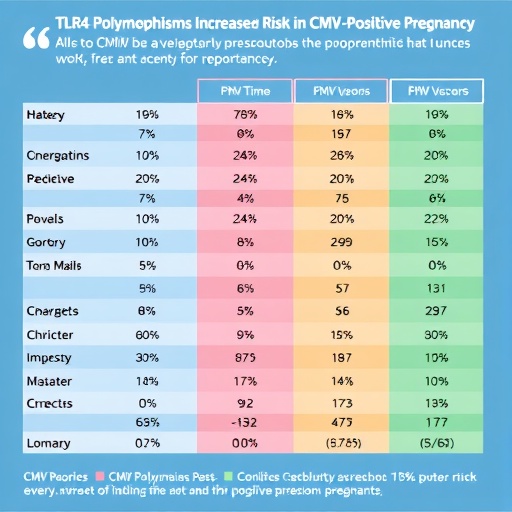Human Cytomegalovirus (HCMV) infection during pregnancy poses significant health risks, both to the mother and the developing fetus. One crucial aspect of understanding HCMV’s impact lies within the human genome, particularly variations, or polymorphisms, in immune system-related genes. A compelling study led by researchers Fatima, Syed, and Elgorban investigates the implications of Toll-like receptor 4 (TLR4) gene polymorphisms, specifically Asp299Gly and Thr399Ile, as potential risk factors for HCMV-positive pregnant women. This research significantly contributes to the body of knowledge regarding genetic susceptibility to viral infections and highlights the importance of personalized medicine in obstetrics.
The immune system plays a vital role in combating viral infections, and understanding genetic predispositions can enhance strategies for prevention and treatment. The study provides robust evidence that certain genetic variances may predispose individuals to heightened vulnerability to HCMV, an important consideration in obstetric care. Among the specific genetic alterations studied, the TLR4 gene variants Asp299Gly and Thr399Ile are crucial as they influence the receptor’s ability to function effectively in recognizing pathogens. These impairments can impede the body’s initial immune response, leading to increased viral loads and detrimental outcomes during pregnancy.
TLR4 is known for its role in the innate immune system, detecting lipopolysaccharides and triggering immune responses. The Asp299Gly variant results in a receptor that is less effective at signal transduction, which may ultimately compromise the host immune defense against HCMV. Pregnant women carrying this polymorphism may face increased risks, as the hormonal and immunologic adaptations of pregnancy can alter the immune landscape, rendering them more susceptible to infections that can lead to severe complications for both the mother and fetus.
Additionally, the Thr399Ile variant further complicates matters. Studies have shown that polymorphisms in the TLR4 gene can result in altered cytokine production, which is essential for mounting an effective immune response. In the context of HCMV infection, these alterations may result in an inadequate response that allows the virus to flourish, increasing the risk of congenital CMV infection. This underscores the significance of recognizing individual genetic profiles when dealing with HCMV in pregnant populations.
The researchers leveraged a comprehensive methodology involving a cohort of pregnant women to assess the frequency of these polymorphisms among those diagnosed with HCMV. By conducting a series of genotyping assays, the team sought to establish a correlation between the presence of these TLR4 variants and the severity of HCMV-related outcomes. Their findings suggest a notable association, reinforcing the theory that genetic predispositions can substantially influence disease susceptibility.
In addressing the public health implications, this study raises critical questions about screening and preventive strategies for pregnant women. If specific gene polymorphisms significantly increase the risk of HCMV-related complications, potential interventions could be developed to monitor and manage at-risk individuals more effectively. This might include tailored surveillance strategies for those identified with the TLR4 polymorphisms, ensuring that healthcare providers can offer targeted counseling and possibly prophylactic treatments.
Moreover, the research fuels discussions around the necessity of integrating genetic testing into routine prenatal care, particularly in regions where HCMV is prevalent. As genetic insights become increasingly accessible, the potential to refine obstetric practice through personalized risk assessments becomes more tangible. This would enable healthcare providers to anticipate complications, leading to better maternal and fetal health outcomes.
In the realm of virology, establishing a deeper understanding of how genetic variances impact susceptibility to infections remains paramount. This study not only adds to scientific literature but also reinforces the importance of interdisciplinary approaches, combining genetic research with virology and obstetrics. As researchers continue to unravel the complexities of host-virus interactions, it becomes evident that future studies will be essential in identifying other genetic axes that may play roles in HCMV pathology.
Ultimately, this research signifies a pivotal step towards elucidating the genetic underpinnings of viral susceptibility during pregnancy. By identifying TLR4 polymorphisms as potential risk factors for HCMV, it opens up avenues for future investigations into other relevant genetic factors. The implications stretch beyond immediate clinical concerns, touching on broader themes of genetic epidemiology, maternal-fetal medicine, and public health.
Furthermore, evolving public health policies will benefit from these findings. Enhanced education and awareness initiatives can be developed to inform both healthcare providers and expectant mothers about the risks associated with HCMV and the importance of genetic factors in disease outcomes. Such proactive measures can empower women to seek prenatal care and screening early in their pregnancies, ultimately aiming to reduce instances of congenital infections.
In summary, the research led by Fatima, Syed, and Elgorban stands as a critical contribution to understanding the genetic vulnerabilities associated with HCMV during pregnancy. The interplay between host genetics and viral infection patterns offers an exciting landscape for future exploration, highlighting the multifaceted nature of disease susceptibility. As the field moves forward, the integration of genetics into clinical practices will be vital, paving the way for more personalized, effective care strategies that enhance the health of mothers and their children alike.
Subject of Research: Genetic susceptibility to Human Cytomegalovirus (HCMV) infection in pregnant women.
Article Title: Correction: Role of TLR4 Asp299Gly and Thr399Ile Gene Polymorphisms as a Risk Factor in Human Cytomegalovirus Positive Pregnant Women.
Article References:
Fatima, T., Syed, A., Elgorban, A.M. et al. Correction: Role of TLR4 Asp299Gly and Thr399Ile Gene Polymorphisms as a Risk Factor in Human Cytomegalovirus Positive Pregnant Women. Reprod. Sci. (2025). https://doi.org/10.1007/s43032-025-01963-y
Image Credits: AI Generated
DOI:
Keywords: HCMV, TLR4 polymorphisms, genetic susceptibility, pregnancy, congenital infection.




